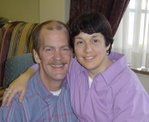Tuesday, February 16, 2010
The Best Medicine
“Better to laugh than cry, says I.” It was the motto Naomi and I tried to remember as we worked together as resident assistants in a freshman dormitory during our junior year of college. It seemed like our floor of girls had more than its share of problems, taxing both our wisdom and relational skills. They also threatened our emotional well being (both the girls and their problems). The phrase, Naomi’s brainchild, helped return smiles to our faces and laughter to our hearts (if not our lips), even in the most trying of times.
If I didn’t have cancer, I might say that my urologist is one of my biggest trials these days. Don’t misunderstand me—he’s a skilled doctor and I am very grateful for his care over the past year. But bedside manner? That he is lacking in this department is an understatement of classic proportions.
Take, for example, the day in March 2009 when he discussed my surgery options. If he removed my kidney with a laparoscopic procedure, the surgical trauma would be minimized because he would be working through four holes in my left side. (Pardon my simplifying things so greatly.) If I elected for him to perform open surgery, he would be able to see better (no use of monitors) and any excessive bleeding that might suddenly occur could be dealt with more easily and quickly. The down side, however, would be a longer recovery time and more unsightly scarring, although since I’d long ago retired my bikini, I really had little reason to care. Still, I chose the more difficult procedure as I considered a swifter recovery.
“That’s good,” my doctor agreed with my decision. “I’m not sure I could cut through all your belly fat if you’d chosen open surgery.”
I was too stunned—and embarrassed—by his words to retort, though many not-too-nice thoughts about his lack of bedside manner crowded my head. I’m sure I also shot a few daggers with my eyes. They must have missed him, though, because his bedside manner never improved.
Just last week came his latest verbal faux pas as I was discussing my rising blood pressure. According to the literature on Sutent, my anti-cancer drug, heart stress is a common side effect—which makes you wonder why this doctor has never once taken my blood pressure or even asked about it during this past year! (For that matter, he’s never checked my weight, either, although remembering my inordinate belly fat, that’s probably a good thing. But that’s another story.)
In any case, I reported to my doctor in layman’s terms that my blood pressure had risen into the 150-165 range on top, with the bottom number in the 100-110 range. With hardly a flicker of interest, he assured me that this isn’t dangerous yet. “Besides,” he added nonchalantly, “elderly people tend to have higher blood pressure anyway.”
After a year of experiencing his limited bedside manner, I was ready for this jolt to my self-esteem. “Doctor,” I responded emphatically, “I am not elderly!” “Oh, excuse me,” he mumbled in reply, his sincerity definitely questionable. Still, I let it go, covering my chagrin with laughter no more truthful than his apology had been.
Since then, however, I’ve related the incident numerous times to friends and family. Each telling is more enjoyable and the laughter is genuine. In the process, I’ve relearned the truth that laughter really is the best medicine (and it costs nothing, unlike Sutent).
Realistically, Dr. M. probably won’t change his bedside manner, even if more of his patients chide him. (Of course, no polite Japanese would ever be so bold or bad-mannered as to challenge a doctor. They leave that to the foreigners.) Nevertheless, I’m feeling much better, thanks to this wonderful elixir. I think I’m due for another dose right now.

